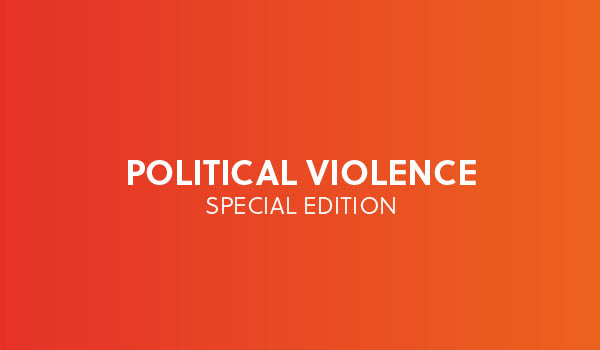WE PUBLISH OUR 2020 POLITICAL VIOLENCE SPECIAL EDITION AMID PROFOUND UNCERTAINTY ABOUT THE GEOPOLITICAL FUTURE.

While we know we are witnessing momentous security developments in many parts of the world, the dust is far from settled.
2019 saw mass protests attracting unprecedented numbers of participants across the globe. From months of mass protests in Hong Kong, to the precarious peace in South Sudan, and the collapse of the Islamic State’s caliphate in the Middle East, several outcomes remain possible for many of last year’s most pivotal events.
But arguably the most consequential political violence story of 2019 was not a political violence story at all. Instead, it is the story of the dawning realisation that climate change, left unchecked, is likely to fundamentally destabilise our societies. And time is running out.
Environmental degradation in 2019 drove mass protests, targeted activism and conflict over scarce resources across the globe. These will only intensify as the effects of climate change become more apparent. This is why we chose the environment as our theme for our 2020 Special Edition.
As scientists continue to find evidence of the deleterious impact we are having on the planet, looking ahead we are likely to see mass environmental protests continue and even expand. For some environmental groups and individuals, street protests do not go far enough. Instead, they have opted for targeted activism that seeks to pressure individual companies or organisations. Tactics have varied, from defacing buildings in the UK to occupying pit mines in Germany, but the affected organisations will need to consider what implications targeted protests will have on their people, assets, and reputations.
 Environmental degradation has the potential to drive conflict more directly, beyond the headlines environmental issues made this year. In 2019, indigenous populations affected by environmental degradation and pollution resisted commercial extraction projects worldwide. For example, in South Africa and Guatemala, indigenous groups staged peaceful protests against mining, while in Ecuador they blockaded oil facilities and forced operations to temporarily shut down. Meanwhile, climate change has exacerbated conflicts over water in India, oil in the Niger Delta, and land in the Brazilian Amazon. These conflicts are likely to become more entrenched as environmental challenges persist. financial hubs, people are demanding action from both governments and businesses.
Environmental degradation has the potential to drive conflict more directly, beyond the headlines environmental issues made this year. In 2019, indigenous populations affected by environmental degradation and pollution resisted commercial extraction projects worldwide. For example, in South Africa and Guatemala, indigenous groups staged peaceful protests against mining, while in Ecuador they blockaded oil facilities and forced operations to temporarily shut down. Meanwhile, climate change has exacerbated conflicts over water in India, oil in the Niger Delta, and land in the Brazilian Amazon. These conflicts are likely to become more entrenched as environmental challenges persist. financial hubs, people are demanding action from both governments and businesses.

As scientists continue to find evidence of the deleterious impact we are having on the planet, looking ahead we are likely to see mass environmental protests continue and even expand. For some environmental groups and individuals, street protests do not go far enough. Instead, they have opted for targeted activism that seeks to pressure individual companies or organisations. Tactics have varied, from defacing buildings in the UK to occupying pit mines in Germany, but the affected organisations will need to consider what implications targeted protests will have on their people, assets, and reputations.
Businesses will need to prepare themselves for change. One of the key challenges will be to understand the risk posed to their operations, as well as the maintenance of organisational resilience in the face of complex and often interlinked effects of climate change. Changing weather patterns, forced migrations and resource scarcity are just some of the myriad obstacles businesses will need to overcome to remain operational and profitable.
At least in the short-term, the security challenges related to climate change will expand rather than contract, as states, organisations and individuals struggle to adopt greener operating models. In 2020, our team will keep a close eye on these and other political violence developments. Together with AXA XL, we will keep our clients informed, resilient, and better prepared to respond when crises happen.
Markus Korhonen
Associate, Security and Crisis Management
Read our 2020 Political Violence Special Edition for more global security insights.





 Email Markus
Email Markus




 @SRMInform
@SRMInform
 S-RM
S-RM
 hello@s-rminform.com
hello@s-rminform.com

